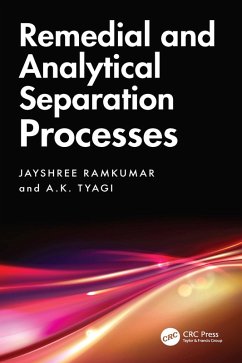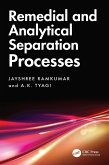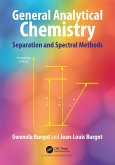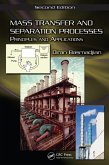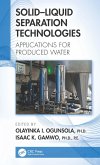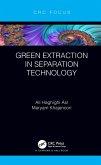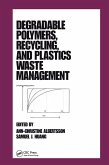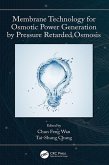52,95 €
52,95 €
inkl. MwSt.
Sofort per Download lieferbar

26 °P sammeln
52,95 €
Als Download kaufen

52,95 €
inkl. MwSt.
Sofort per Download lieferbar

26 °P sammeln
Jetzt verschenken
Alle Infos zum eBook verschenken
52,95 €
inkl. MwSt.
Sofort per Download lieferbar
Alle Infos zum eBook verschenken

26 °P sammeln
- Format: PDF
- Merkliste
- Auf die Merkliste
- Bewerten Bewerten
- Teilen
- Produkt teilen
- Produkterinnerung
- Produkterinnerung

Bitte loggen Sie sich zunächst in Ihr Kundenkonto ein oder registrieren Sie sich bei
bücher.de, um das eBook-Abo tolino select nutzen zu können.
Hier können Sie sich einloggen
Hier können Sie sich einloggen
Sie sind bereits eingeloggt. Klicken Sie auf 2. tolino select Abo, um fortzufahren.

Bitte loggen Sie sich zunächst in Ihr Kundenkonto ein oder registrieren Sie sich bei bücher.de, um das eBook-Abo tolino select nutzen zu können.
This book describes comprehensive, integrated view of separation science backed by discussions about simple extraction and partition processes to give better understanding of chromatography and membrane separations. It paves way for understanding of fundamental physical and chemical phenomena involved in separations and transport reactions.
- Geräte: PC
- mit Kopierschutz
- eBook Hilfe
Andere Kunden interessierten sich auch für
![Remedial and Analytical Separation Processes (eBook, ePUB) Remedial and Analytical Separation Processes (eBook, ePUB)]() Jayshree RamkumarRemedial and Analytical Separation Processes (eBook, ePUB)52,95 €
Jayshree RamkumarRemedial and Analytical Separation Processes (eBook, ePUB)52,95 €![General Analytical Chemistry (eBook, PDF) General Analytical Chemistry (eBook, PDF)]() Gwenola BurgotGeneral Analytical Chemistry (eBook, PDF)71,95 €
Gwenola BurgotGeneral Analytical Chemistry (eBook, PDF)71,95 €![Mass Transfer and Separation Processes (eBook, PDF) Mass Transfer and Separation Processes (eBook, PDF)]() Diran BasmadjianMass Transfer and Separation Processes (eBook, PDF)152,95 €
Diran BasmadjianMass Transfer and Separation Processes (eBook, PDF)152,95 €![Solid-Liquid Separation Technologies (eBook, PDF) Solid-Liquid Separation Technologies (eBook, PDF)]() Solid-Liquid Separation Technologies (eBook, PDF)51,95 €
Solid-Liquid Separation Technologies (eBook, PDF)51,95 €![Green Extraction in Separation Technology (eBook, PDF) Green Extraction in Separation Technology (eBook, PDF)]() Ali Haghighi AslGreen Extraction in Separation Technology (eBook, PDF)20,95 €
Ali Haghighi AslGreen Extraction in Separation Technology (eBook, PDF)20,95 €![Degradable Polymers, Recycling, and Plastics Waste Management (eBook, PDF) Degradable Polymers, Recycling, and Plastics Waste Management (eBook, PDF)]() AlbertssonDegradable Polymers, Recycling, and Plastics Waste Management (eBook, PDF)68,95 €
AlbertssonDegradable Polymers, Recycling, and Plastics Waste Management (eBook, PDF)68,95 €![Membrane Technology for Osmotic Power Generation by Pressure Retarded Osmosis (eBook, PDF) Membrane Technology for Osmotic Power Generation by Pressure Retarded Osmosis (eBook, PDF)]() Membrane Technology for Osmotic Power Generation by Pressure Retarded Osmosis (eBook, PDF)50,95 €
Membrane Technology for Osmotic Power Generation by Pressure Retarded Osmosis (eBook, PDF)50,95 €-
-
-
This book describes comprehensive, integrated view of separation science backed by discussions about simple extraction and partition processes to give better understanding of chromatography and membrane separations. It paves way for understanding of fundamental physical and chemical phenomena involved in separations and transport reactions.
Dieser Download kann aus rechtlichen Gründen nur mit Rechnungsadresse in A, B, BG, CY, CZ, D, DK, EW, E, FIN, F, GR, HR, H, IRL, I, LT, L, LR, M, NL, PL, P, R, S, SLO, SK ausgeliefert werden.
Produktdetails
- Produktdetails
- Verlag: Taylor & Francis eBooks
- Seitenzahl: 148
- Erscheinungstermin: 15. November 2024
- Englisch
- ISBN-13: 9781040176580
- Artikelnr.: 72289615
- Verlag: Taylor & Francis eBooks
- Seitenzahl: 148
- Erscheinungstermin: 15. November 2024
- Englisch
- ISBN-13: 9781040176580
- Artikelnr.: 72289615
- Herstellerkennzeichnung Die Herstellerinformationen sind derzeit nicht verfügbar.
Jayshree Ramkumar obtained her MSc (Analytical Chemistry) in 1993 from Madras University, Chennai and joined Bhabha Atomic Research Centre (BARC) Training School, Mumbai in the same year. After completing one year orientation course in Nuclear Science and Technology, she joined the Analytical Chemistry Division of BARC in 1994. She is also an Associate Professor (Chemistry) at Homi Bhabha National Institute (HBNI), Mumbai. She has been involved in research in areas of separation science and analytical chemistry. Her PhD was on the studies using Nafion membranes and bulk liquid membrane for achieving separation of various species like metal ions and organic compounds. She was awarded MANA fellowship for carrying out postdoctoral research at National Institute of Materials Science, (NIMS) Tsukuba, Japan. Her work involved the synthesis of mesoporous materials for applications as sorbents for removal of toxic species. She has been collaborating with universities through the BRNS and AERB projects as the principal collaborator. She has reviewed BRNS, AERB and DST project proposals for their suitability for funding. She is member of Doctoral committee of HBNI, Editorial board of journals and serves as external examiner for PhD students of different Universities. She has more than 75 publications including papers in international journals and book chapters to her credit.
A. K. Tyagi joined Chemistry Division, BARC in 1986 through BARC Training School and received Ph.D. degree in 1992. He did postdoctoral research at Max-Planck Institute, Stuttgart, Germany (1995-96). He occupied various positions at BARC such as Director, Chemistry Group, Director, Bio-Science Group, Head, Chemistry Division etc. He was a Distinguished Scientist, DAE. Presently, he is Dean, Homi Bhabha National Institute (HBNI), Mumbai and Honorary Professor at JNCASR, Bengaluru. His research interests are in the field of nanomaterials, functional materials, nuclear materials, metastable materials and Hybrid materials. He has to his credit 47 PhD students (awarded: 36, Submitted: 3 and ongoing: 8) and about 650 papers in journals. He has been conferred with a number of awards such as such as DAE-Homi Bhabha Science and Technology Award, DAE-SRC Outstanding Researcher Award, MRSI Medal; MRSI-ICSC Materials Science Senior Award; MRSI-CNR Rao Prize in Advanced Materials; MRSI Distinguished Materials Scientist of the year award ; CRSI Bronze Medal and so forth. He is a Fellow of several national and international science academies such as National Academy of Sciences, India (FNASc); Indian Academy of Sciences (FASc); Indian National Academy of Engineering (FNAE); Indian National Science Academy (FNA); Royal Society of Chemistry (FRSC) and The World Academy of Sciences (FTWAS).
A. K. Tyagi joined Chemistry Division, BARC in 1986 through BARC Training School and received Ph.D. degree in 1992. He did postdoctoral research at Max-Planck Institute, Stuttgart, Germany (1995-96). He occupied various positions at BARC such as Director, Chemistry Group, Director, Bio-Science Group, Head, Chemistry Division etc. He was a Distinguished Scientist, DAE. Presently, he is Dean, Homi Bhabha National Institute (HBNI), Mumbai and Honorary Professor at JNCASR, Bengaluru. His research interests are in the field of nanomaterials, functional materials, nuclear materials, metastable materials and Hybrid materials. He has to his credit 47 PhD students (awarded: 36, Submitted: 3 and ongoing: 8) and about 650 papers in journals. He has been conferred with a number of awards such as such as DAE-Homi Bhabha Science and Technology Award, DAE-SRC Outstanding Researcher Award, MRSI Medal; MRSI-ICSC Materials Science Senior Award; MRSI-CNR Rao Prize in Advanced Materials; MRSI Distinguished Materials Scientist of the year award ; CRSI Bronze Medal and so forth. He is a Fellow of several national and international science academies such as National Academy of Sciences, India (FNASc); Indian Academy of Sciences (FASc); Indian National Academy of Engineering (FNAE); Indian National Science Academy (FNA); Royal Society of Chemistry (FRSC) and The World Academy of Sciences (FTWAS).
1. Introduction to Environment Alteration and Reshaping 2. Separation
Process: Imperative to Human Life 3. Membrane Separation: Primordial Water
Treatment Technique 4. Sorption: Backbone of Separation Science 5.
Phytoremediation: An Emerging Green Auxillary Technique 6. Chemical
Precipitation, Coagulation, and Flocculation: Triad of Great Versatility 7.
Chromatographic Techniques: Workhorse of Analytical Chemistry 8. Broad
conclusions and Future Perspectives
Process: Imperative to Human Life 3. Membrane Separation: Primordial Water
Treatment Technique 4. Sorption: Backbone of Separation Science 5.
Phytoremediation: An Emerging Green Auxillary Technique 6. Chemical
Precipitation, Coagulation, and Flocculation: Triad of Great Versatility 7.
Chromatographic Techniques: Workhorse of Analytical Chemistry 8. Broad
conclusions and Future Perspectives
1. Introduction to Environment Alteration and Reshaping 2. Separation
Process: Imperative to Human Life 3. Membrane Separation: Primordial Water
Treatment Technique 4. Sorption: Backbone of Separation Science 5.
Phytoremediation: An Emerging Green Auxillary Technique 6. Chemical
Precipitation, Coagulation, and Flocculation: Triad of Great Versatility 7.
Chromatographic Techniques: Workhorse of Analytical Chemistry 8. Broad
conclusions and Future Perspectives
Process: Imperative to Human Life 3. Membrane Separation: Primordial Water
Treatment Technique 4. Sorption: Backbone of Separation Science 5.
Phytoremediation: An Emerging Green Auxillary Technique 6. Chemical
Precipitation, Coagulation, and Flocculation: Triad of Great Versatility 7.
Chromatographic Techniques: Workhorse of Analytical Chemistry 8. Broad
conclusions and Future Perspectives
